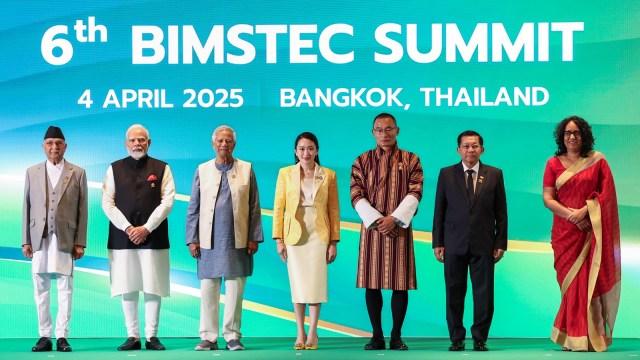Opinion How not to miss the BIMSTEC opportunity, again
The success of the Bangkok Vision 2030 will ultimately depend not on the ambition of its goals but on the commitment of member states to translate vision into reality
 The Bangkok Vision 2030 presents a fresh opportunity to overcome past limitations and forge a more integrated, prosperous, and sustainable future for the region's 1.7 billion people. (ANI Photo)
The Bangkok Vision 2030 presents a fresh opportunity to overcome past limitations and forge a more integrated, prosperous, and sustainable future for the region's 1.7 billion people. (ANI Photo) As the sixth Summit of the Bay of Bengal Initiative for Multi-Sectoral Technical and Economic Cooperation (BIMSTEC) is underway in Bangkok, the regional grouping stands at a pivotal juncture. Under the theme “Prosperous, Resilient, and Open BIMSTEC,” member states will adopt the Bangkok Vision 2030 — a pioneering roadmap for future cooperation that promises to transform the Bay of Bengal region.
This summit, three years after the virtual Colombo Summit of 2022, is an opportunity to revitalise regional integration to address common challenges facing Bangladesh, Bhutan, India, Myanmar, Nepal, Sri Lanka, and Thailand. Despite its potential, the organisation has struggled to translate its ambitious vision into concrete outcomes. The Bangkok Vision 2030 presents a fresh opportunity to overcome past limitations and forge a more integrated, prosperous, and sustainable future for the region’s 1.7 billion people.
BIMSTEC’s journey over the past 25 years reflects the complex dynamics of regional cooperation in South and Southeast Asia.
The adoption of the BIMSTEC Charter at the fifth Summit in 2022 was a landmark development, providing the organisation with a formal institutional framework. The establishment of the BIMSTEC Secretariat in Dhaka in 2014 represented another significant milestone, enhancing the organisation’s capacity for coordinated action.
Progress has also been made in identifying priority sectors for cooperation. From the initial six sectors in 1997, BIMSTEC has expanded to cover 14 areas, with each member state leading efforts in specific domains. The BIMSTEC Free Trade Area Framework Agreement, signed in 2004, laid the groundwork for economic integration, though implementation has been slow.
Thailand’s chairmanship has introduced the PRO BIMSTEC vision, emphasising three key pillars: Prosperity, Resilience, and Openness. This framework aims to accelerate poverty alleviation, enhance preparedness for crises, and promote sustainable development through multi-stakeholder approaches. The “Prosperous” element focuses on promoting trade, investment, and sustainable development to address poverty. Under the “Resilient” pillar, emphasis is placed on increasing productivity in agriculture, livestock, and fisheries, as well as enhancing preparedness for health crises — a priority underscored by the Covid-19 pandemic. The “Open” dimension promotes sustainable tourism and broader regional connectivity.
Bangkok vision 2030: A blueprint for transformation
The Bangkok Vision 2030, to be adopted at the summit, represents BIMSTEC’s most comprehensive roadmap to date. Aligned with the United Nations’ Sustainable Development Goals (SDGs) and Thailand’s Bio-Circular-Green (BCG) economic model, the vision sets clear directions and priorities for regional collaboration over the next five years.
Key agreements to be signed at the summit include the agreement on Maritime Transport Cooperation, aiming to boost cargo and passenger transport across the Bay of Bengal. Additionally, the Memoranda of Understanding with the Indian Ocean Rim Association (IORA) and the United Nations Office on Drugs and Crime (UNODC) will establish new developmental partnerships, expanding BIMSTEC’s network of international collaborations.
The adoption of the Rules of Procedure for BIMSTEC Mechanisms will complement the BIMSTEC Charter, strengthening the institutional framework for regional cooperation. Furthermore, the Report of the Eminent Persons Group on the Future Direction of BIMSTEC, finalised after extensive consultations in 2024, will provide strategic guidance for the organisation’s evolution.
Missed opportunities and implementation challenges
BIMSTEC’s journey so far has been marked by several missed opportunities. The BIMSTEC Free Trade Agreement, initiated in 2004, remains unimplemented, highlighting the difficulties in translating political commitments into economic reality. Similarly, progress on connectivity initiatives has been slower than anticipated, with many infrastructure projects facing delays and funding constraints.
Political differences among member states have occasionally hampered cooperation, particularly in sensitive areas like security and counterterrorism. The organisation’s consensus-based decision-making approach, while ensuring equal voice for all members, has sometimes resulted in policy paralysis on contentious issues.
Institutional capacity constraints have limited its effectiveness. The Secretariat remains understaffed and underfunded compared to similar regional organisations. The absence of a dedicated financial mechanism for joint projects has meant that implementation often depends on individual member states’ resources and priorities.
From vision to implementation
For Bangkok Vision 2030 to succeed where previous initiatives failed, key actions are essential. Strengthening institutional capacity must be prioritised by enhancing the BIMSTEC Secretariat’s resources and mandate, establishing permanent working groups, and creating a dedicated fund for regional projects. Accelerating economic integration requires a renewed commitment to the BIMSTEC Free Trade Agreement, with clear timelines for negotiations on trade, services, and investment to boost intra-regional trade beyond its current level of less than 10 per cent.
Enhancing connectivity across physical, digital, and people-to-people dimensions is crucial, requiring the implementation of the BIMSTEC Master Plan for Transport Connectivity alongside the upcoming Agreement on Maritime Transport Cooperation. Strengthening sectoral cooperation in areas like climate change, disaster management, and public health is essential for building regional resilience, especially in light of lessons learned from the pandemic. Finally, engaging wider stakeholders — including governments, business communities, civil society organisations, and academia — would enhance the inclusivity and effectiveness of regional cooperation through forums and Track 1.5 and 2.0 initiatives.
A pivotal moment
most read
The Sixth Summit and the Bangkok Vision 2030 come at a critical juncture. Amid global economic uncertainties, geopolitical tensions, and shared transnational challenges, effective regional cooperation has never been more important. The summit offers an opportunity to transform BIMSTEC from a forum for dialogue into an engine for regional development and integration. By addressing implementation gaps, strengthening institutions, and fostering inclusive cooperation, BIMSTEC can realise its potential as a bridge between South and Southeast Asia.
The success of the Bangkok Vision 2030 will ultimately depend not on the ambition of its goals but on the commitment of member states to translate vision into reality. As the leaders gather in Bangkok, they have an opportunity to chart a new course for regional cooperation — one that delivers tangible benefits to the 1.7 billion people who call the Bay of Bengal region home.
The writer is Senior Director of the international think tank IPAG India, which also has a presence in Dhaka, Melbourne, Dubai and Vienna. Views are personal





